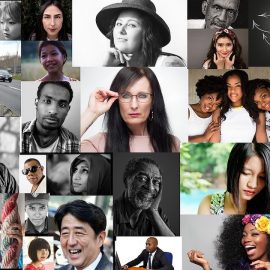

This article is an excerpt from the Shortform book guide to "The Light We Carry" by Michelle Obama. Shortform has the world's best summaries and analyses of books you should be reading.
Like this article? Sign up for a free trial here.
How does discrimination affect self-esteem? How does being discriminated against based on superficial differences hurt one’s sense of self-worth?
Discrimination places a spotlight on how minorities are different from the majority, overlooking those people’s talents, personalities, and achievements. As a result, minorities grow to value themselves and others less based on these differences.
Keep reading to learn about the psychological effects of discrimination.
Minimizing Personhood
Discrimination causes self-consciousness when the majority fixates on minorities’ differences to the point of minimizing their personhood. They focus on how minorities differ from them and overlook their individuality. This happens because members of the majority value their own personhood and consider their attributes part of said personhood. As such, any departure from these valued attributes is seen as negative and reducing someone’s worth.
Over time, minorities begin to internalize this method of assigning value, Obama warns. They focus on the way they and other minorities differ from the majority, and they’re more likely to value themselves and others less based on these differences. (Shortform note: Internalized discrimination affects people’s ability to use their skills. Studies show people who identified as minorities on a test scored significantly worse than those who didn’t. By requiring them to identify as a minority, the test focused participants on their minority status and the majority’s negative perception of their abilities, making it hard for them to focus on accessing their skills.)
Obama says encouraging diversity is the key to reducing this kind of discrimination. As members of the majority encounter more minorities, they’ll become more used to the differences people have and start seeing beyond those differences to the minorities’ personhood. Realizing that minorities have equal worth and personhood encourages the majority to realize their worth doesn’t depend on attributes such as ethnicity, gender, or sexuality. Thus, they’ll be less likely to devalue people who don’t share those attributes, reducing discrimination.
| The Psychology of Discrimination Discrimination occurs when a person is treated poorly because they’re different from the majority. According to some experts, this is caused by in-group bias: people’s tendency to glorify groups they belong to while treating other groups poorly. As mentioned previously, humans have a natural tendency to categorize themselves and other people. This categorization is important to people’s sense of identity, but it can also make people look only at the group a person is in when determining who they are—only at their differences, as Obama puts it. The more different a person is from them, the easier it is for someone to draw hard boundaries between groups and not look beyond those boundaries. This tendency to categorize leads to unfair treatment because people want to boost their self-esteem: They attach their sense of identity to the group they belong to, so their self-esteem depends on the status of that group. They’ll glorify their group and denigrate others because if their group is the best, they’re also the best for belonging to it. This becomes discrimination when one group is in a position of power and uses that power to make their in-group bias systemic. For example, if in-group members who break a law are regularly treated more leniently than members of other groups, that’s discrimination. In The Coddling of the American Mind, Greg Lukianoff and Jonathan Haidt agree with Obama that diversity is important for reducing the psychological effects of discrimination. They add that choosing the right method of encouraging diversity is important: Focus on providing equal opportunities, they stress, not attaining equal outcomes. According to Lukianoff and Haidt, focusing on equal outcomes means people still overemphasize minorities’ differences, though this time the focus is caused by the need to fulfill a quota. For instance, instead of fixating on an athlete’s gender because they don’t believe women can play as well as men, a university fixates on their gender because they need to attract a certain number of women athletes. In both cases, the women’s ability to get on the team is dictated by their gender, rather than their skills. Focusing on equal opportunity lets people be judged on merit: The university welcomes women athletes, but since they aren’t worried about meeting a quota, they can judge the athletes by their abilities, ignoring their gender. This may result in slower change, as it takes time for minorities to use the equal opportunity, but it’s ultimately more effective at reducing discrimination. |

———End of Preview———
Like what you just read? Read the rest of the world's best book summary and analysis of Michelle Obama's "The Light We Carry" at Shortform.
Here's what you'll find in our full The Light We Carry summary:
- Michelle Obama's advice on fulfilling your potential in life
- The benefits of nurturing and sharing your unique abilities and strengths
- How to overcome the obstacles to reaching your potential and creating change






